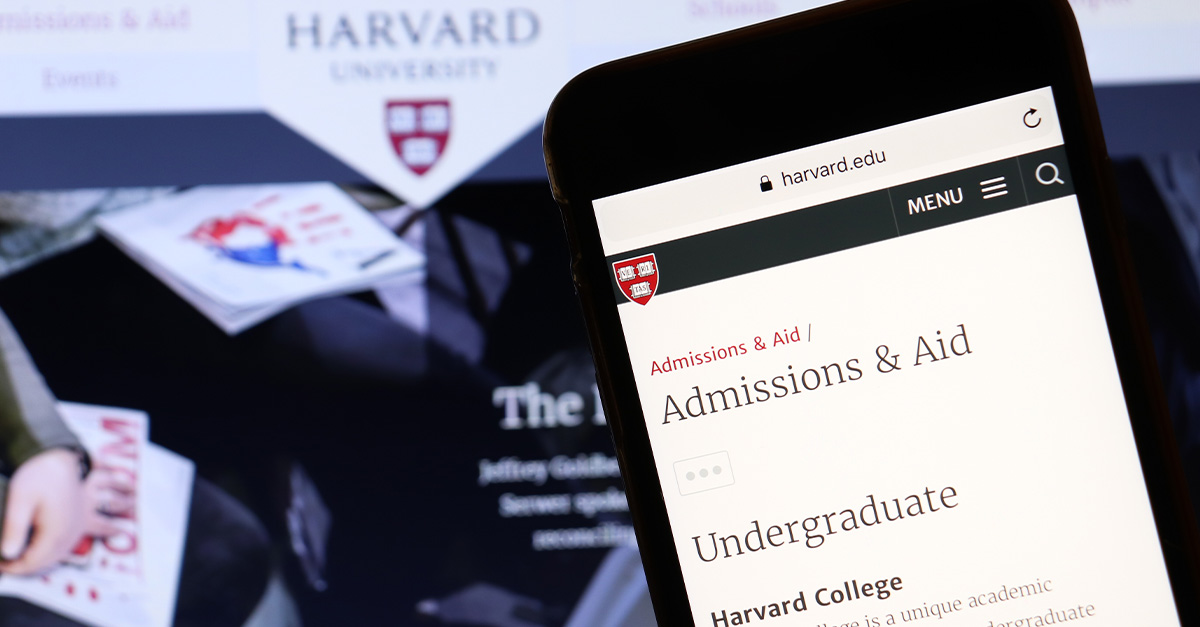


Get a free copy of Parental Rights & Education when you subscribe to our newsletter!

The U.S. Supreme Court has agreed to take up a pair of cases alleging that Harvard University and the University of North Carolina have and continue to engage in race-based admission policies that disadvantage Asian-American and white applicants.
The Supreme Court has consolidated two cases, Students for Fair Admissions, Inc v. University of North Carolina and Students for Fair Admissions Inc. v. President & Fellows of Harvard College, into one since the issues involved are so similar and will hear arguments next term.
The advocacy group behind the cases, Students for Fair Admissions (SFFA), contend that Harvard and UNC’s admission system is discriminatory to Asian American and white students and is asking the court to end affirmative action policies in university admissions.
“Harvard’s undergraduate admissions policies and procedures have injured and continue to injure Plaintiff’s members by intentionally and improperly discriminating against them on the basis of their race and ethnicity in violation of Title VI,” the complaint reads.
The claims against Harvard were in initially struck down in the U.S. District Court for the District Court of Massachusetts by Judge Allison Burroughs, an Obama appointee. In her reasoning, the federal judge suggested that “race-conscious admissions will always penalize to some extent the groups that are not being advantaged by the process, but this is justified by the compelling interest in diversity and all the benefits that flow from a diverse college population.”
Harvard has denied that its admission policies are discriminatory, accusing the SFFA of upending the precedent that allows schools to foster on-campus student diversity by considering the racial makeup of its applicants. “Having failed to make the case that Harvard’s admissions practices contravene the court’s precedents governing the use of race in admissions, SFFA asked the court to overthrow them. But SFFA offers no legitimate justification for such an extraordinary step,” Harvard wrote in a May 2021 filing.
SFFA, however, alleges that as a result of racial classifications, racial preferences, and racial quotes used by some colleges and universities, Asian Americans are especially disadvantaged in the application process due to receiving lower “personal ratings” and are admitted at a lower rate than white and other applicants despite having higher test scores on average. Additionally, SFFA has asked the Court to overturn Grutter v. Bollinger, a 2003 decision in which the Supreme Court upheld the right of college admissions boards to place special consideration on applicants’ race under the guise of benefitting minority groups and enhancing diversity.
“Grutter’s core holding, that universities, can use race in admissions to pursue student-body diversity, is plainly wrong,” SFFA said in a statement, arguing that their case against Harvard’s policy gives the court an “ideal vehicle” for re-evaluating its stance on affirmative action.
The U.S. solicitor general had asked the U.S. Supreme Court to deny a review of the challengers’ objections, arguing that they sought to “relitigate case-specific factual disputes that both lower courts resolved against” them, and that the case would be “a poor vehicle for reconsidering Grutter v Bollinger.”
The Court, however, has given no indication thus far that they have been persuaded by the U.S. Solicitor General’s arguments thus far. Chief Justice John Roberts once said, “It is a sordid business, this divvying us up by race.” And Justice Clarence Thomas issued a straightforward rebuke on affirmative action in 2013, stating, “The Constitution does not pander to faddish theories about whether race mixing is in the public interest. The Equal Protection Clause strips States of all authority to use race as a factor in providing education.”
Author Carrie Severino also stated on social media, “Great to see the Court taking these cases, and to quote Justice Thomas, addressing the “insidious consequences (of) racial engineering.”

Whatever the original intention, relying on “affirmative action,” or “race-based preferences, or “diversity, equity, and inclusion” as an admissions policy over that of meritocracy is that it will always result in discrimination — discrimination against individuals based on their immutable color or ethnicity.
Consider these text messages exchanged by UNC admissions officers about an individual applicant:
—“perfect 2400 SAT All 5 on AP one B in 11th”
—“Brown?!”
—“Heck no. Asian.”
—“Of course. Still impressive.”
Another quotation reads: “with these [underrepresented minority] kids, I’m trying to at least give them the chance to compete even if the [extracurriculars] and essays are just average.”
By contrast, a meritocracy provides an objective standard, and students — of every color, race, or demographic— can improve their chances of getting accepted by the college of their choice simply by studying harder than the competition.
That is the essence and foundation of the American dream and Martin Luther King Jr.’s dream of a colorblind society — the belief that anyone can succeed through his or her own talents, creativity, and willingness to work incredibly hard and persist in the face of hurdles, no matter what their color, race, or station in life. To say that a member of a racial group cannot succeed without a leg up or assistance from a more powerful entity, be it sweeping government policy or an Ivy League admissions officer, is, on its face, racist because it presumes a general inferiority of all members of a group and certainly doesn’t take into account that each individual is unique and can succeed or fail based on their own personal strengths and weaknesses.
Everyone deserves to have the opportunity to apply for and earn admissions to a school — or, for that matter, a job or a promotion at any organization — based on the merits of their application. That only “some” Asian Americans are given this chance by universities because of racial quotas is a true injustice and a violation of the Civil Rights Act and the 14th Amendment. High-achieving individuals should not be penalized because they happen to be part of a “racial group” that has more than its “fair share” of high-achieving individuals.
As Justice Thomas himself noted, anytime the government — or private organizations permitted to do so by government policy — “places citizens on racial registers and makes race relevant to the provision of burdens or benefits, it demeans us all.”

Notifications